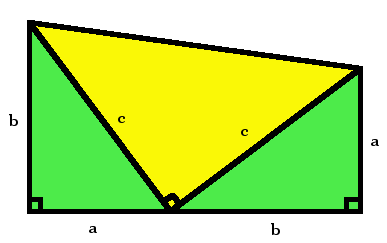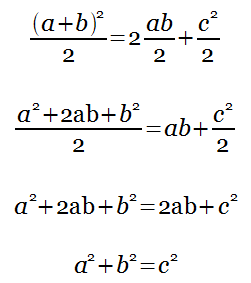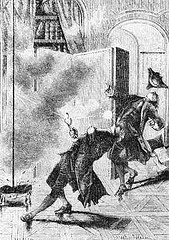407 = 43 + 03 + 73
Science & Math
Math Made Easy
142857 is a cyclic number — you can find its multiples simply by rotating its digits:
- 142857 × 1 = 142857
- 142857 × 2 = 285714
- 142857 × 3 = 428571
- 142857 × 4 = 571428
- 142857 × 5 = 714285
- 142857 × 6 = 857142
Also: 1428572 = 20408122499, and 20408 + 122449 = 142857.
A Novel Proof

We’ve had some pretty smart presidents. James Garfield devised this proof of the Pythagorean theorem in 1876, while serving in the House of Representatives:
The area of the trapezoid above is

The area of each green triangle is

And the yellow triangle is

So:

The Voting Paradox
Suppose we hold an election with three candidates, X, Y, and Z. And suppose the voters fall into three groups:
Group 1 prefers, in order, X, Y, Z
Group 2 prefers, in order, Y, Z, X
Group 3 prefers, in order, Z, X, Y
Now, if Candidate X wins, his opponents can rightly object that a majority of voters would have preferred Candidate Z. And corresponding arguments can be made against the other candidates. So even though we’ve held a fair election, it’s impossible to establish majority rule.
The Marquis de Condorcet noted this oddity in the 1700s; it’s sometimes known as Condorcet’s paradox.
Math Notes
32 – 23 = 3 – 2
Thunderstruck

Georg Wilhelm Richmann was attending a meeting at the St. Petersburg Academy of Sciences in August 1753 when he heard thunder. He ran home with another man, hoping to record how an insulated rod responded to an electrical storm.
He succeeded, in a way: A ball of lightning leapt from the rod and struck Richmann in the head, killing him instantly and knocking his companion unconscious. That makes Richmann the first person in history to die while conducting electrical experiments.
Joseph Priestley wrote, “It is not given to every electrician to die in so glorious a manner as the justly envied Richmann.” That’s one way to look at it.
Bertrand’s Postulate
Think of a number greater than 1. Double it.
Between these two values is at least one prime number.
Who’s in Charge Here?
“A hen is only an egg’s way of making another egg.” — Samuel Butler
“A zygote is a gamete’s way of producing more gametes. This may be the purpose of the universe.” — Robert Heinlein
“The nucleic acids invented human beings in order to be able to reproduce themselves even on the moon.” — Sol Spiegelman
Math Notes
27 – 1 = 127
Right Side Up

Set a beetle or a turtle on its back and it will right itself.
Remarkably, so will the Gömböc — a mathematical shape that can’t be knocked down. Set it down in any position and it will always “get to its feet”:
